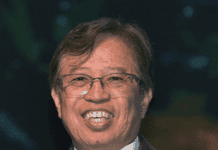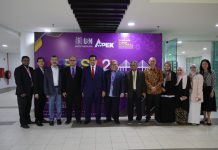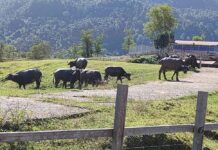
GYEONGJU, SOUTH KOREA: With a computer game application to promote
nuclear science, a secondary school team from Malaysia won the international student competition, whose winners were announced at the IAEA’s Third International Conference on Human Resource Development for Nuclear Power Programmes in Gyeongju, South Korea, today.
The team from SMK Kuala Besut secondary school named their App “100 Things about Nuclear Science and Life”. After launching the educational tool earlier this year, the students found that participating locals and tourists had drastically changed their views about the nuclear industry.
“Before the project, 93% of participants expressed negative attitude towards nuclear science and technology,” said Safyyah binti Muhammad Nasir, one of the three Malaysian students on the winning team.
“But after familiarising themselves with basic elements of nuclear applications, 96% of respondents had a positive perception of both nuclear energy and science.”
The student competition, held in conjunction with the four-day Conference, was aimed at fostering interest in nuclear science and technology among secondary school students. Open to participants worldwide, students aged 14-18 were assigned with the task to promote discussion and awareness of the current and future impact of nuclear science and technology.
Five finalist teams, one each from Hungary, Japan, Malaysia, South Korea and the United States, who designed and implemented the most innovative projects, won a trip to Gyeongju to present their projects at the IAEA conference.
Wan Mod Shatar, the teacher overseeing the team at SMK Kuala Besut secondary school underlined: “It is important to note that our students are from a fishing village in Malaysia, where knowledge about nuclear science is limited. Through this competition, they not only had to interact with the community, but have also started exploring a new scientific field.”
Criteria for initial selection included accuracy, innovativeness, potential impact, and gender balance, among others.
“When we first learned about the IAEA International Student Competition, we knew that this was a great opportunity to learn more about the nuclear industry and underline our passion for a world with safe nuclear energy,” said Andrew King, vice principal from Alliance Dr. Olga Mohan High School in the United States, one of the finalist teams. The students from the high school found that the image of nuclear energy among students was clouded by fear over nuclear weapons and that greater industry outreach was needed to inform students of careers in the nuclear sector.
With the closing of the conference, Yves Bréchet, France’s High Commissioner for the Alternative Energies and Atomic Energy Commission, underlined that from primary school to doctoral programmes, all levels of education are crucial for the future of nuclear energy. In fact, all contemporary
issues faced by the nuclear industry have counterparts in education and training.
Increasing public acceptance of nuclear power, requires education of the general public and raises the importance of a scientific education for everybody.
The need to increase efficiency and safety must mobilize a new generation of engineers more familiar with computer simulation and data analysis.
Developing innovation will require engineering science, long term projects, and academics from various fields.
The IAEA’s Third International Conference on Human Resource Development for Nuclear Power Programmes, held from 28 the 31 May, attracted over 520 participants and observers from 51 Member States and five organisations.















